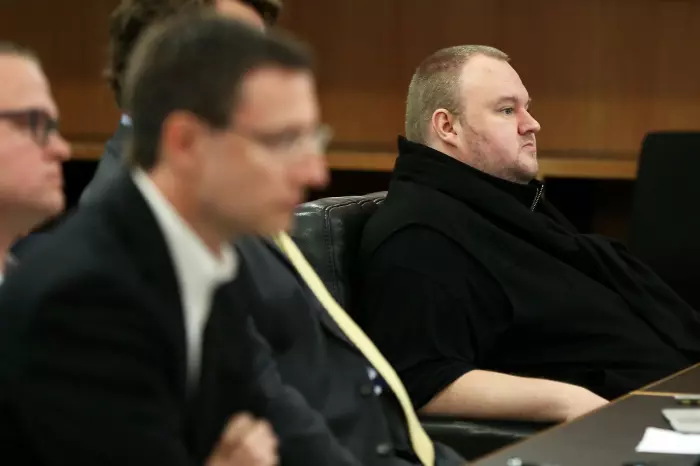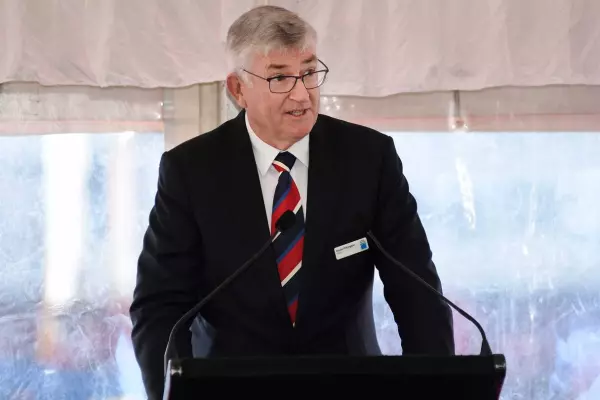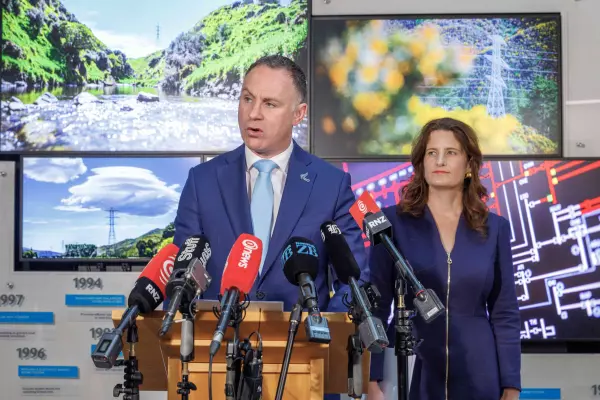Kim Dotcom and his co-accused have spent the better part of a decade arguing they’re the target of a vast conspiracy perpetuated by Hollywood moguls, major recording labels, and the White House seeking to protect a broken business model.
The larger-than-life Dotcom – who also happens to tower above most at a height of almost two metres - burst into New Zealand public consciousness as the target of an over-the-top military-style raid back in January 2012, involving two helicopters and the deployment of the heavily armed Special Tactics Group.
Like a made-for-TV super-villain, he was arrested only after breaking down the door to a panic-room.
Since then, things have ground along more slowly. The fact that the perennial start-up founder, one-time political aspirant, and online celebrity has oodles of cash has meant justice has been anything but swift. But then, extraditions are like that.
Just ask Kyung Kim, NZ’s first extradition case involving China. He was first arrested in June 2011, spent five years in prison, and is still fighting tooth and nail to stay here.
Dotcom's at least a man of means, with five children, a wife, an ex-wife, and – by all accounts – a perfectly lovely lifestyle in Queenstown.
And for that, NZ should actually be a little thankful.
The pressure placed on NZ’s intelligence agencies when it was discovered the Government Communications Security Bureau was intercepting an NZ resident’s communications has seen a change in culture and practice - for the better - at both the GCSB and the Security Intelligence Service.
Both agencies have made strides to become more transparent about what they do, without giving away national secrets, and loose legislation was tightened up.
He’s also given lawyers ample opportunity to force the courts to critically assess NZ’s extradition law and the treaties that sit alongside them. In an increasingly inwardly focused world, that’s probably a good thing.
Exposing the copyright conundrum
But where his lawyers have made the biggest contribution is in talking about copyright in the 21st century, albeit unsuccessfully for the client.
Dotcom and his former Megaupload lieutenants Mathias Ortmann, Bram van der Kolk and Finn Batato consistently argued the copyright infringement claims weren’t criminal offences in NZ and thus couldn’t be used to leverage the more serious charges of wire fraud and conspiracy. Nor were they extraditable offences because they've got to be a crime in both countries.
It’s telling that the High Court, Court of Appeal and Supreme Court have all shot that argument down.
In NZ law, there’s no special exclusion for copyright law.
In fact, what the Megaupload crew are accused of can be boiled down to simple dishonesty that was effectively theft.
An example that crops up multiple times throughout the various judgments is when van der Kolk uploaded the Liam Neeson film Taken to Megaupload in 2008 and sent the link to another person, before its US release in 2009.
“We accept the United States’ submission that dishonesty can arise from the ability to provide access to the movie Taken without Mr van der Kolk or the others using the file paying for that access,” the Supreme Court ruled.
“The movie has been accessed and no benefit has passed to the copyright owner. This is on the basis that a file known to infringe copyright has been uploaded to Megaupload and a link sent to another person.
“There is accordingly conduct alleged which, if it had occurred in New Zealand, could meet the elements of s 228(b) (dishonest use of a document with the intent to obtain a pecuniary advantage),” the court said, in reference to the Crimes Act.
An arguable point?
While that seems clear-cut – and has ultimately been borne out in law – there is something to the Megaupload team’s defence that the copyright status of that movie was murkier, given it had been released in 30 other countries.
However, the extradition hearings are only to establish whether there’s a case to answer. The copyright argument – along with most of Team Dotcom’s arguments – are better left to the substantive hearing when they have their day in court in the US.
Those thorny issues are an excellent reminder of the sloth-like progress of NZ's overhaul of copyright law.
The Ministry of Business, Innovation and Employment’s been trying to get the law fit for purpose since its 2016 study into the role of copyright and registered designs in the creative sector gave it a much better grasp of the issues that had arisen since the previous copyright review in 2004.
Back then, many people still used 'Ask Jeeves' as a serious alternative to Google and Facebook didn't exist.
A consultation between November 2018 and April 2019 attracted a range of views. But when it came up with another paper in November 2019 outlining revised objectives of the review, the feedback it received prompted it to withdraw that paper last July.
MBIE is now looking to hold another round of consultation in the upcoming parliamentary term, which will include potential options to change the regime.
Familiar tactics
As with most consultations, the lines are drawn between those calling for looser settings that allow for greater innovation, such as tech companies, schools, libraries and consumer groups, and rights-holders - those who produced the material - wanting to ensure they’re protected against having third-parties rip off their content without paying for it.
There’s an element of this tension at play in the media sector, where online publishers find themselves pitted against social media giants who’ve cornered the digital advertising market by leveraging other people’s content.
This issue cropped up in the 2018 issues paper, with the likes of Sky Network Television and NZME - but surprisingly not Stuff - pointing at the likes of Facebook for undermining their ability to generate online revenue.
Internet NZ went for a bob each way, saying individual businesses and content creators were best-placed to judge the challenges and opportunities such platforms create. It recommended MBIE’s options paper include resourcing for better guidance, which could cover social media use and open licences.
These will be issues incoming Commerce Minister David Clark will have to contend with - if he's brave enough.
Copyright law reform is a topic that has made tougher ministers shudder.
A few years ago, Clark would have seemed a safe set of hands, but after disgracing himself during the covid lockdown when he breached his own rules by moving more freely than he should have, the jury’s out on whether he’ll be able to navigate the copyright minefield.














